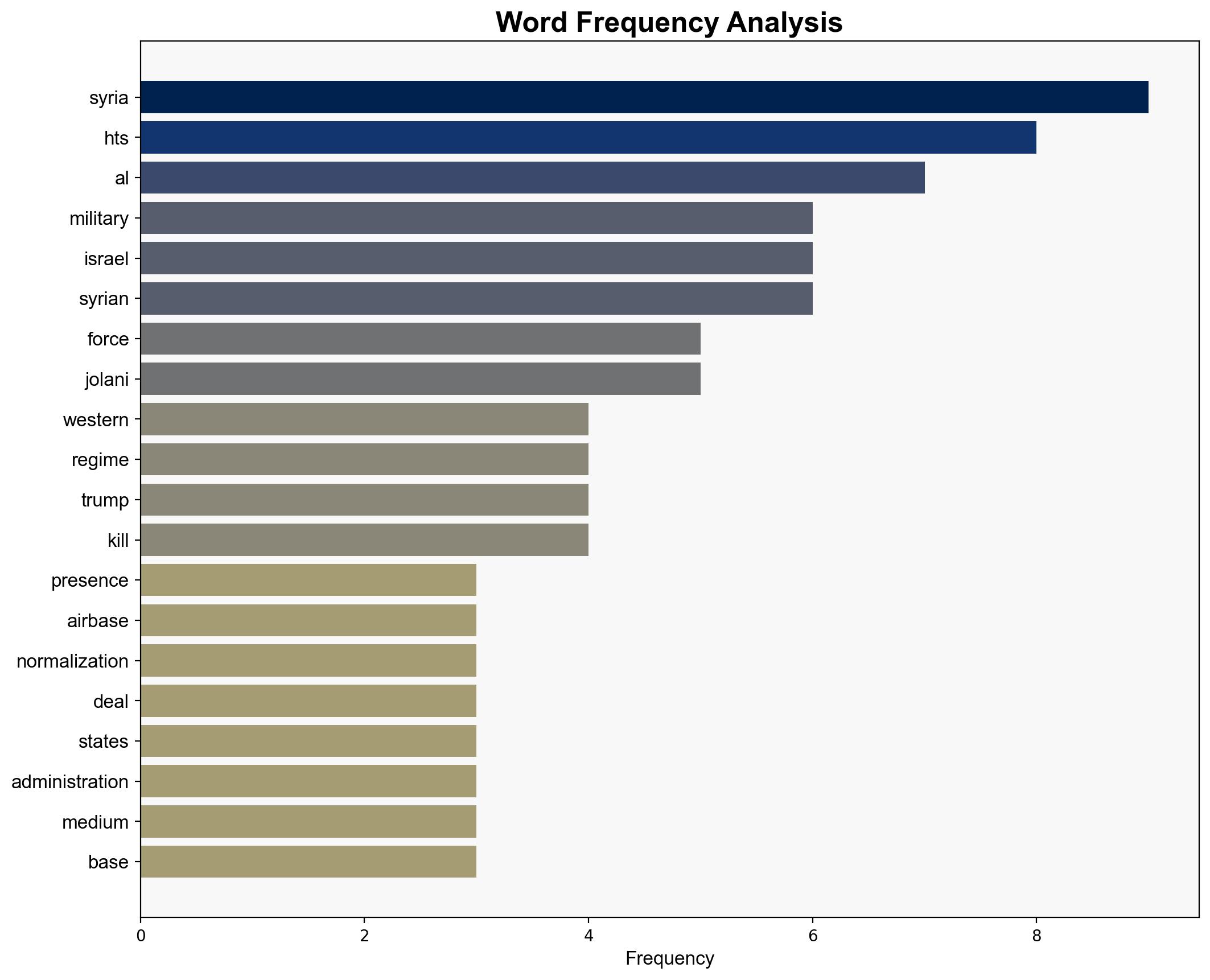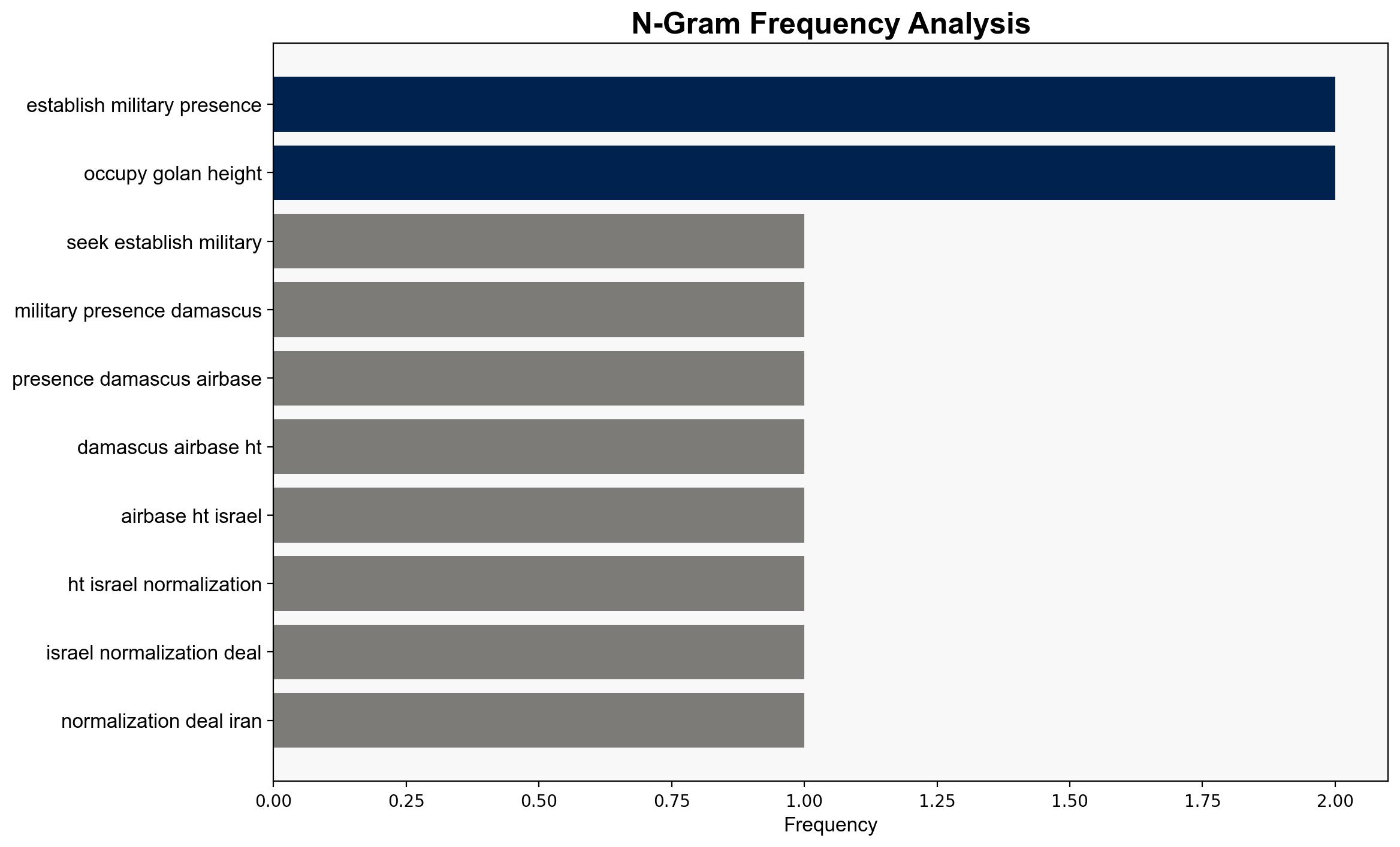US seeks to establish military presence at Damascus airbase amid HTS-Israel normalization deal – Globalsecurity.org
Published on: 2025-11-07
Intelligence Report: US seeks to establish military presence at Damascus airbase amid HTS-Israel normalization deal – Globalsecurity.org
1. BLUF (Bottom Line Up Front)
The strategic judgment is that the United States’ potential establishment of a military presence at a Damascus airbase is primarily aimed at facilitating a normalization deal between HTS and Israel, with a secondary objective of countering Iranian influence in Syria. This hypothesis is supported by multiple sources indicating US involvement in brokering the deal. The confidence level in this assessment is moderate due to the complexity and sensitivity of the geopolitical dynamics involved. Recommended action includes diplomatic engagement with regional allies to ensure stability and continuous monitoring of HTS activities.
2. Competing Hypotheses
1. **Hypothesis A**: The US seeks to establish a military presence at the Damascus airbase primarily to support a normalization deal between HTS and Israel, thereby stabilizing the region and reducing Iranian influence.
2. **Hypothesis B**: The US military presence is primarily aimed at securing strategic footholds in Syria to counter Daesh and other extremist groups, with the HTS-Israel deal being a secondary consideration.
Using Analysis of Competing Hypotheses (ACH), Hypothesis A is better supported due to the alignment of US strategic interests in reducing Iranian influence and the direct involvement of US officials in the normalization talks. Hypothesis B lacks direct evidence linking the military presence to counter-terrorism efforts alone.
3. Key Assumptions and Red Flags
– **Assumptions**: It is assumed that HTS is willing to normalize relations with Israel and that the US has sufficient leverage to broker such a deal.
– **Red Flags**: The reliability of sources claiming unconditional US backing of HTS is questionable. There is a potential cognitive bias in assuming HTS’s willingness to shift alliances.
– **Missing Data**: Details on the specific terms of the HTS-Israel deal and the exact nature of US military involvement are lacking.
4. Implications and Strategic Risks
– **Geopolitical**: A successful HTS-Israel normalization could shift regional alliances, potentially isolating Iran and altering power dynamics in the Middle East.
– **Cascading Threats**: Failure of the deal could lead to increased hostilities, undermining US influence and destabilizing the region further.
– **Psychological**: Perceptions of US favoritism towards HTS could fuel anti-American sentiment and propaganda by adversaries.
5. Recommendations and Outlook
- Engage with regional partners to build a coalition supporting the normalization process.
- Enhance intelligence-sharing mechanisms to monitor HTS activities and ensure compliance with the deal.
- Scenario Projections:
- **Best Case**: Successful normalization leads to regional stability and reduced Iranian influence.
- **Worst Case**: Breakdown of talks results in increased conflict and US strategic setbacks.
- **Most Likely**: Partial success with ongoing challenges in fully implementing the deal.
6. Key Individuals and Entities
– Abu Mohammed al-Jolani
– Donald Trump
– HTS (Hay’at Tahrir al-Sham)
– Israeli Government
7. Thematic Tags
national security threats, geopolitical strategy, counter-terrorism, Middle East dynamics





